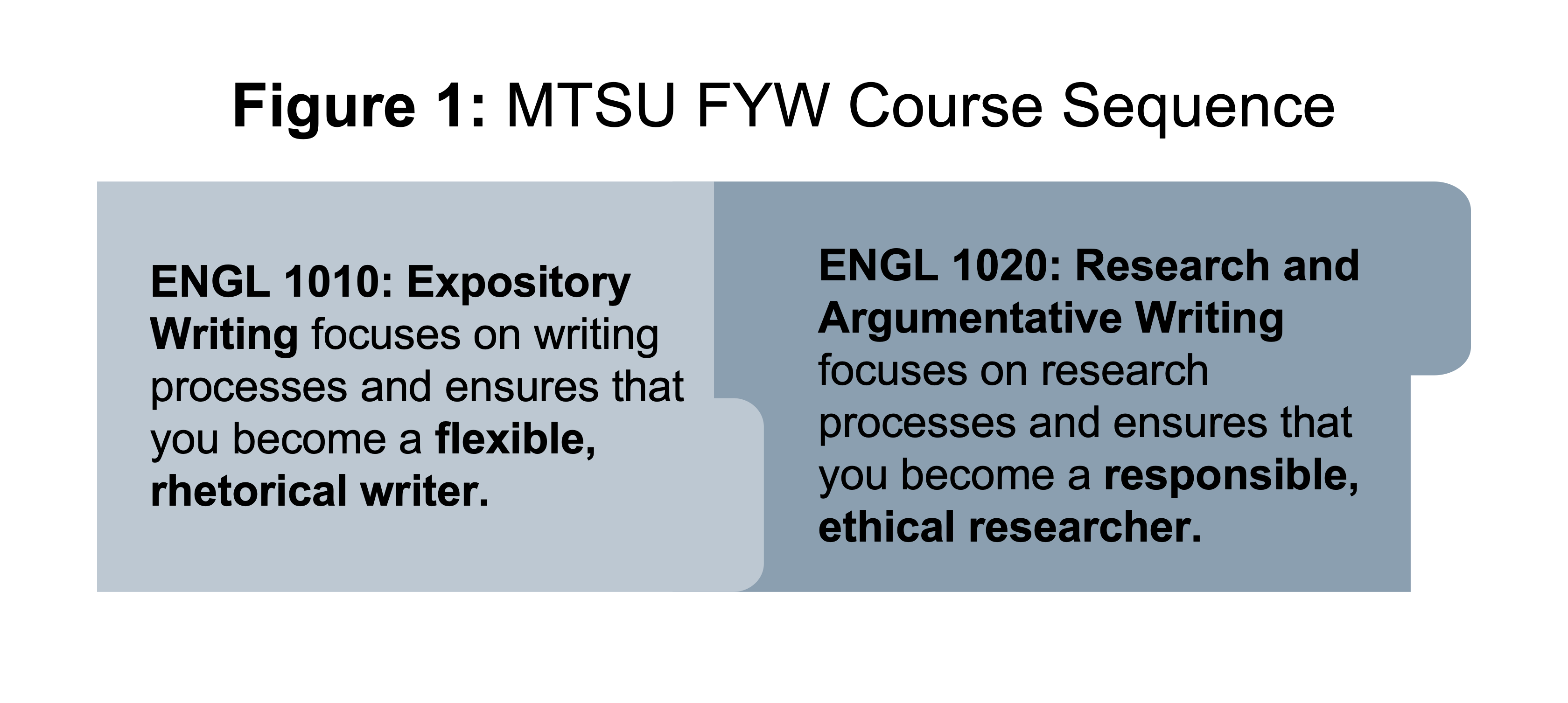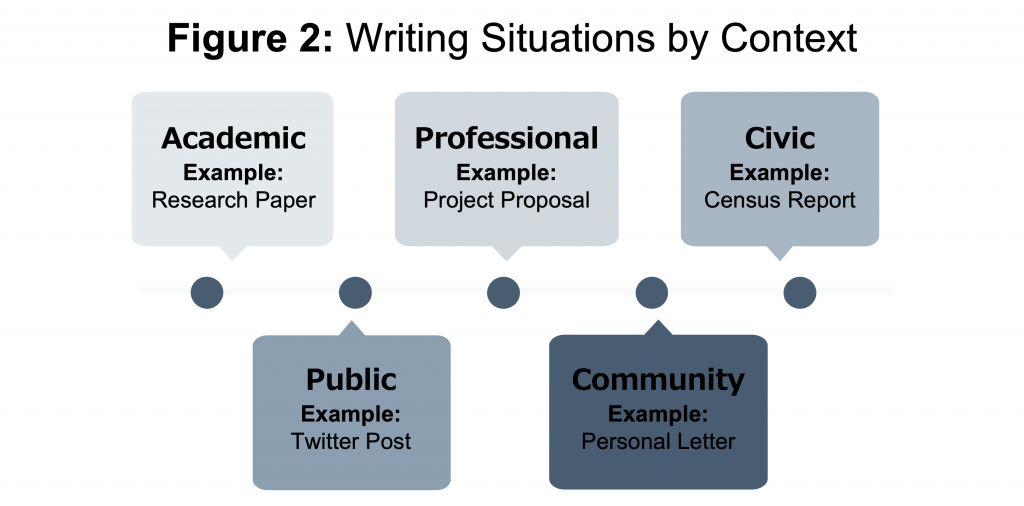Introduction to First-Year Writing
1 First-Year Writing at MTSU
Erica M. Stone and Kate L. Pantelides
On behalf of the English Department at Middle Tennessee State University (MTSU), WELCOME to English 1020: Research and Argumentative Writing! MTSU’s two-semester, first-year writing sequence (see Figure 1) is designed to support your growth as a reader, writer, and communicator. This course textbook is an Open Educational Resource (OER) designed to be accessible to students and faculty and to reduce the overall cost of course materials. This OER was made possible with the generous support of the MTSU Provost’s Office and the Tennessee Board of Regents. It includes specific information about writing at MTSU as well as peer-reviewed articles about the writing process. Along with the GenEd Magazine (GEM), this OER will support your reading, writing, and thinking in ENGL 1020.
MTSU FYW Program Outcomes and Learning Objectives
Program Outcomes and Learning Objectives are the foundation for the first-year writing sequence at MTSU. Our first-year writing courses have a rhetorical foundation that draws attention to the questions we should ask when composing as well as the conventions, norms, and expectations of different genres. We approach learning about the writing process this way instead of trying to prepare you for each individual genre you will encounter in your academic and professional life because writing contexts are always changing! The genres you’re writing in today will likely not be the ones most important to your careers, and you may be composing in totally different genres in the near future, but learning about the thinking, situations, processes, habits, and practices associated with effective writing will transfer to your future writing opportunities. View a copy of our Program Outcomes and Learning Objectives for First-Year Writing Courses at MTSU here.

Writing in ENGL 1020
In ENGL 1010: Expository Writing, you practiced primary research and writing in different genres or writing situations, while also being invited to consider each rhetorical situation or the context in which writing develops. ENGL 1020: Research and Argumentative Writing focuses on research and argumentative writing, and it builds on what you learned in ENGL 1010: Expository Writing. Your understanding of genre, your ability to read and write rhetorically, and your grasp of rhetorical situations will be invaluable for your success in ENGL 1020. You will find yourself drawing on these crucial lessons from ENGL 1010 as you navigate the challenges of ENGL 1020: practicing rhetorical analysis, performing secondary research, choosing and composing in an appropriate genre in which to share your research, critically reading and analyzing sources, building your understanding of rhetorical timeliness and delivery, and experimenting with and integrating new types of knowledge in your writing.
Additionally, English 1020 allows for a more intense focus on the invention process, what some call prewriting or brainstorming. Invention is a rhetorical term for the writing you compose and the thinking you do do in service of developing compositions. As you begin English 1020, consider: What interests you? What research topics and questions do you want to pursue? What do you want to take away from this course?
Writing with a Growth Mindset
Writing with a growth mindset (i.e. seeing challenges as an opportunity for growth instead of failure) is imperative to your success in ENGL 1020. The key is to become flexible and mindful about writing situations and how effective writing changes, depending on the context. In ENGL 1020 you will consider how better understanding the writing and research process can help you transfer your learning to other academic, professional, civic, public, and community writing situations (see Figure 2).

In the broadest sense, learning how to approach writing situations effectively and how to make the most of our writing experiences is the purpose of the MTSU writing course sequence. One of the most important keys for success in ENGL 1010 and ENGL 1020—as well as for your development as a writer outside of the classroom—is to adopt a growth mindset by grappling with areas of difficulty instead of turning away from challenges. English Studies scholar Kelly Gallagher believes that exploring confusion by determining what accounts for it and discerning how to work through it is what leads to learning. Ultimately, what sets successful readers and writers apart is not an innate ability, but rather the willingness to acknowledge confusion and persevere until an understanding is reached. During your writing and research experiences in ENGL 1020, we encourage you to be open to new ideas and to experiment with your writing. You might be surprised to learn how much you can accomplish and how well you can write when you push yourself to work hard and use the resources designed to support your growth.
Considering the English Major or Minor
You may be wondering if an English major or minor is right for you. If you enjoy ENGL 1010 and 1020 and think that you might want more, there are lots of reasons to pursue a major or minor in English, and there are lots of empirical studies that prove that a major in the liberal arts paves the way for success after graduation (Moody). In general, employers are less concerned with specific majors and more interested in an individual’s ability to make independent decisions and communicate effectively. By exploring avenues of inquiry that support their growth as readers, writers, and thinkers, English majors develop their abilities to compete in a market that is, as scholars such as Deborah Brandt remind us, characterized by changing workplace realities.
The English Major Experience
- The major consists of 30 – 36 hours out of the 120 required for graduation. Students have more than 100 courses in the English department from which to choose.
- Upon declaring English as their major, students are matched with a faculty advisor with whom they work closely throughout their tenure as MTSU students.
- English classes are small (15 – 25 seats), so students and teachers get to know each other and can work collaboratively.
- Students have the opportunity to participate in seminars, lectures, internships, study abroad offerings, and online classes.
- Students study more than words on a page. English majors are invited to read and respond to diverse texts, films, images, and audio recordings.
- Peck Hall, the English department home, is located on the historic side of campus, and students often carry conversations from the classroom out into the shade of Walnut Grove.
Media Attributions
- Figure 1: MTSU FYW Course Sequence (Credit: Dr. Erica Stone)
- Figure 2: Writing Situations by Context (Credit: Dr. Erica Stone)
to make by putting together parts or elements: to make up, form, frame, fashion, construct, produce; to make or produce in literary form, to write as author
the elements, themes, topics, tropes, characters, situations, and plot lines common in specific genres--types of writing
often thought of as a type or category of writing, e.g. business memos, organization charts, menus, book reviews; a discursive response to a recurrent, social action; materials that mediate social interaction
the act of bringing knowledge or skills from one context to another; the goal of a first-year writing course is to transfer the writing skills developed in the class to other writing situations

